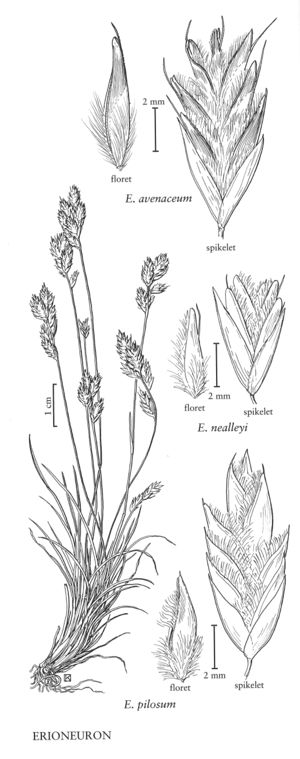Difference between revisions of "Erioneuron avenaceum"
FNA>Volume Importer |
FNA>Volume Importer |
||
| Line 8: | Line 8: | ||
|name=Tridens grandiflorus | |name=Tridens grandiflorus | ||
|authority=unknown | |authority=unknown | ||
| − | }}{{Treatment/ID/Synonym | + | }} {{Treatment/ID/Synonym |
|name=Erioneuron grandiflorum | |name=Erioneuron grandiflorum | ||
|authority=unknown | |authority=unknown | ||
| Line 23: | Line 23: | ||
-->{{Treatment/Body | -->{{Treatment/Body | ||
|distribution=Ariz.;N.Mex.;Tex. | |distribution=Ariz.;N.Mex.;Tex. | ||
| − | |discussion=<p>Erioneuron avenaceum is common in rocky areas from the southwestern United States to central Mexico; it also grows in Bolivia and Argentina. North American plants belong to E. avenaceum (Kunth) Tateoka var. avenaceum. Stoloniferous plants occur in the Flora region, but they are most common in central Mexico.</p> | + | |discussion=<p><i>Erioneuron avenaceum</i> is common in rocky areas from the southwestern United States to central Mexico; it also grows in Bolivia and Argentina. North American plants belong to <i>E. avenaceum</i> (Kunth) Tateoka var. avenaceum. Stoloniferous plants occur in the Flora region, but they are most common in central Mexico.</p> |
|tables= | |tables= | ||
|references= | |references= | ||
| Line 44: | Line 44: | ||
|publication year= | |publication year= | ||
|special status= | |special status= | ||
| − | |source xml=https://jpend@bitbucket.org/aafc-mbb/fna-data-curation.git/src/ | + | |source xml=https://jpend@bitbucket.org/aafc-mbb/fna-data-curation.git/src/8f726806613d60c220dc4493de13607dd3150896/coarse_grained_fna_xml/V25/V25_71.xml |
|subfamily=Poaceae subfam. Chloridoideae | |subfamily=Poaceae subfam. Chloridoideae | ||
|tribe=Poaceae tribe Cynodonteae | |tribe=Poaceae tribe Cynodonteae | ||
Revision as of 16:33, 18 September 2019
Culms (7)10-30(40) cm tall, (0.4)0.7-1 mm thick, glabrous; nodes glabrous or villous. Ligules to 0.5 mm; blades (1.5)3-5(8) cm long, (0.5)1-1.5(2.5) mm wide, both surfaces sparsely pilose. Panicles 2-8(10) cm; branches with 2-10(16) shortly pedicellate spikelets. Spikelets 6-8(10) mm, purplish, with (4)6-12(20) florets; lower glumes 4-7 mm; upper glumes 6-9 mm, equaling or exceeding the lowest florets; lemmas 4-7 mm, purplish-green, awned from between the lobes, awns 2-4 mm, apices bilobed, lobes 1-2 mm, obtuse to acute; anthers 0.4-1 mm or (when monandrous) to 1.3 mm. Caryopses 1-1.4 mm. 2n = 16, 32.
Distribution
Ariz., N.Mex., Tex.
Discussion
Erioneuron avenaceum is common in rocky areas from the southwestern United States to central Mexico; it also grows in Bolivia and Argentina. North American plants belong to E. avenaceum (Kunth) Tateoka var. avenaceum. Stoloniferous plants occur in the Flora region, but they are most common in central Mexico.
Selected References
None.
